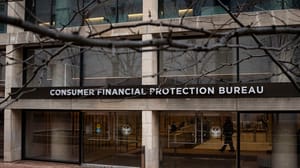Banks Come in From the Cold for Hedge FundsBanks Come in From the Cold for Hedge Funds
Banks made up five of the 50 stocks most commonly in the top ten holdings of hedge funds at the start of 2017.
March 6, 2017

By Maiya Keidan and Svea Herbst-Bayliss
LONDON/BOSTON, March 6 (Reuters) - Bank stocks are back invogue for hedge funds, which have shunned the industry over thepast seven years due to a squeeze on banks' profitability fromlow interest rates and because of their opaque balance sheets.
The election of U.S. President Donald Trump has alreadytempted some hedge funds back into bank stocks to raise theirbets on deregulation and interest rate rises in the UnitedStates, which could help banks to earn higher returns ondeposits.
"I think people are overweighting," Hilmi Unver, partner athedge fund investor Notz Stucki Group, said. "Financials shouldbenefit from interest rates going up." He also said Trump waspro deregulation, which would benefit U.S. banks.
Banks made up five of the 50 stocks most commonly in the topten holdings of hedge funds at the start of 2017, the largestportion since 2013, data from Goldman Sachs showed.
Among the top five stocks were Bank of America Corp,JPMorgan Chase & Co, Wells Fargo & Co, Citigroup and Citizens Financial Group.
Globally, institutional investor appetite for hedge fundsbuying bank stocks has risen in January to its highest levelsince 1999, estimated at 16.4 percent, up from 13.9 percent inDecember 2016, according to preliminary data from industrytracker Blue Lion Research.
Many managers favour U.S. banks stocks, but some hedge fundsare also trickling into European banks even though some of theselenders are still dealing with fallout from the 2008 financialcrisis and now face uncertainty from upcoming elections.
"European banks trade at almost half the valuation of U.S.banks and I think the political risk is overstated ... a lot ofpeople are on the sidelines," said one London-based hedge fundmanager who started adding European banks to his portfolio inJanuary. "The big money will be made by buying these thingsnow."
“One of our biggest long positions is Credit Suisse," LarsFranstedt, chief investment officer and partner at $150 millionMadrague Capital Partners, said. "We believe that it’s one ofthe best ways to play long in the financial industry."
Said Haidar, president and chief executive officer at $313million Haidar Capital Management, which is long banks globally,also said European banks looked cheap.
Low and even negative interest rates in Europe have made itdifficult for banks to generate profits on deposits, depressingtheir shares, which has kept many hedge funds away.
But banks' profits could improve now interest rates are onthe rise in the United States and ultimately could rise inEurope too.
"In Europe, where banks trade at steep discounts to book(value), steeper curves, the coming end to quantitative easingfollowed by rate hikes in late 2018 or early 2019 should bolsterresults," Haidar said.
Wellington Management’s hedge fund Bay Pond Partners, a fundwhich focuses on the financial sector in general, has benefitedfrom a strong move in bank stocks.
After losing 7.1 percent in 2016, the fund gained 6.4percent in January, several people familiar with the fund’sperformance said.
Representatives for the fund were not immediately availableto comment.
U.S. hedge fund manager Dan Loeb shifted his focus to banks,he wrote in an investor letter on Wednesday, with the sector nowmaking up 11.8 percent of his $15 billion fund, up from 4.4percent on Nov. 8.
Before the financial crisis, many hedge funds reaped bigrewards from a bull market in banks between 2005 and 2007. Theythen took short positions on banks between mid-2007 and 2009,betting on falling share prices. During this period, forexample, Bank of America shares lost almost 75 percent of theirvalue, according to Thomson Reuters data.
But after 2009, most funds stepped back from banks becauseof pressure on deposits from low interest rates. Some even shutup shop completely. Lansdowne Partners, one of London's oldesthedge funds, closed its financials fund last year, which hadlost 18.7 percent in the first 40 days of 2016. (Reporting by Maiya Keidan, additional reporting by LawrenceWhite and Lawrence Delevingne. Editing by Jane Merriman)





